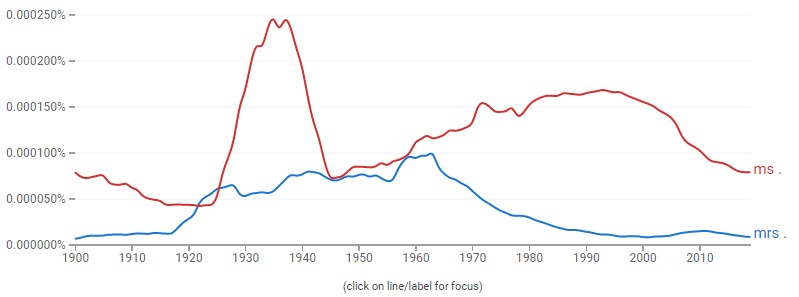Mr., Mrs., Ms. and Miss are titles that are used before surnames or full names as a sign of respect. We will look at the definition of these terms, where they come from, when to use them and some examples of their use in sentences.
Mr.
Mr. is a title used before a surname or full name of a male, whether he is married or not. Mr. is an abbreviation for Mister, it is pronounced like the word Mister. The abbreviation Mr. has been in use since the fifteenth century, it is a variant of the word master. Master is still occasionally used as a title for a boy, there is no abbreviation.
Mrs.
Mrs. is a title used before a surname or full name of a married female. Mrs. is an abbreviation for the word Missus, it is pronounced like the word Missus. The abbreviation Mrs. has been in use since the sixteenth century, it is a variant of the word mistress.
Ms.
Ms. is a title used before a surname of full name of a female whether she is married or not. Ms. has been in use since the 1950s, it is a portmanteau of the words Miss and Missus. The title of Ms. was popularized by Ms. magazine in the 1970s.
Miss
Miss is a title used before a surname or full name of an unmarried female. Miss is an abbreviation of mistress. Note that each of these common titles are capitalized.
Common Questions Concerning Use
Despite the above information concerning the use of these titles, there are plenty of questions and misconceptions beyond their official definitions. We are addressing some of those below, so you are comfortable with the official forms of use in writing.
Ms. Vs Mrs. Etiquette: When Ms. Is A Preferred Title
Since Ms. and Mrs. can be used as interchangeable terms, you might wonder what the proper etiquette rule is based on marital status. Mrs. is the incorrect title for a single woman, but Ms. can be used as an official title for married and unmarried women. So, how do you know which is the preferred title?
The answer is to ask what personal preference a woman would like used. Ms. is often used as a more formal form of address in a professional setting or as a professional title to help distinguish a woman from her husband. Since it can also be a more respectful use for a mature, single woman, it is best to ask to avoid any disrespect. If asking is not possible, Ms. is generally accepted as a neutral term and is, in fact, more popular to use due to this.

Why Is There an R in Mrs.?
If Mrs. is an abbreviation of missus, then where does the “r” come from? Remember, missus is a variation of mistress, and so Mrs. represents the original formal title form.
What is Proper Wedding Invitation Wording?
When addressing envelopes for wedding invitations, or similar formal events, you want to make sure you use what you have learned about the differences between Ms., Mrs., and Miss. When addressing a married couple, you will use both the respective titles of Mr. and Mrs. followed by the surname. If only inviting the woman, use Mrs., and if unsure of marital status, default to the form Ms.
When inviting an unmarried couple, use the man’s name first following Mr., followed by the woman’s name with Ms.: for example, Mr. John Smith and Ms. Holly Doe.
For young women under 18, include Miss. before their name.
Why Do I Sometimes See Ms., Mrs., Miss., and Mr. Without Periods?
You may sometimes see these terms used without a period and wonder which is correct. American English uses a period, while British English does not. If you see the use without periods, you are most likely reading a British publication. Depending on where you live, you want to adapt the use to what is appropriate and not mix the two uses.
Examples
Three components of Mr. Trump’s platform and statements seem to be underlying such a view: a big surge of spending on infrastructure, corporate tax cuts, and (financial and business) de-regulation. (The Huffington Post)
Mrs. Brown’s Boys has picked up three National Television Awards, TV Choice Awards, three Scottish BAFTAs, four IFTA awards, a TV Times Award, Royal Television Society Winner and a TV BAFTA for Best Situation Comedy to being a ratings smash across the globe. (The Manchester Evening News)
Ms. Clinton is a Methodist girl raised up in her church. (The Washington Post)
But that is exactly what we have with Tim Burton and MISS PEREGRINE’S HOME FOR PECULIAR CHILDREN, a gloriously goth, visually imaginative and engaging film yet with a caring, sweet edge that finds Tim Burton once again at the top of his game and almost assuredly, at the top of the box office. (The Culver City Observer)
Wrapping it Up
Overall these aren’t confusing rules to follow, and this article should serve as an official guide for you to refer to when looking for the respective titles of both married and single men and women, as well as young adults and children. Just be sure to use the proper American English forms with periods rather than sans period as the British do unless you are specifically writing for a British publication.
If you found this helpful, we’d love it if you would share it to help others clear up any confusion they may have!